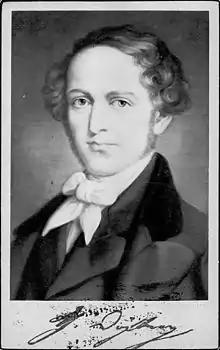Theodor Döhler
Baron Theodor Döhler (20 April 1814 – 21 February 1856) was a German composer and a notable piano virtuoso of the Romantic period. He studied under Julius Benedict, Carl Czerny, and Simon Sechter.[1]
Theodor Döhler | |
|---|---|
 Theodor Döhler's photo by Sophus Williams. | |
| Background information | |
| Genres | Classical music |
| Occupation(s) | Pianist |
| Instrument(s) | Piano |
Biography
Life
Döhler was born in Naples, where his father (d. 1843 in Lucca) lived and worked as Kapellmeister. Döhler was a child prodigy and received his first musical education in Naples from the conductor Julius Benedict. He began performing in public concerts there at the age of 13.
In 1827, he moved to Lucca when his father received a new appointment there. From 1829 to 1834 Döhler lived in Vienna, where he studied piano under Carl Czerny. At the same time, he studied composition with Simon Sechter. He appeared on the scene in 1838, when Liszt in Vienna and Thalberg were again in Paris.[2] In 1846, Döhler's patron, the Duke of Lucca, elevated Döhler to the rank of Baron. Now a member of the nobility, Döhler was able to marry a Russian Princess, Countess Elise Sheremeteff in that year.
Following this, Döhler gave up public performance and settled for a while in Moscow. In 1848 he moved back to Naples where he composed piano pieces and one opera, Tancreda, which was first produced in 1880, 24 years after his death, which occurred in Florence in 1856.
Career
In 1832, he was taken under the musical patronage of the Duke of Lucca. From 1834 until 1845 he toured Europe as a concert pianist, performing in Italy, France, the Netherlands, Denmark, Poland, and Russia. He was considered a very successful and fashionable piano virtuoso.[3]
Compositions
- Piano Concerto in A+ Op. 7
- Nocturne Op. 24
- Nocturne No. 1 in C major Op. 25
- Tarantella Op. 39
- Andante for piano left hand No. 33 Op. 42
- Romance sans paroles (Romance Without Words)
Concerto pour piano et orchestre (Howard Shelley piano/conductor, with Tasmanian Symphony Orchestra) Hyperion CDA67950
References
- Henri Bertini (1798-1876) & Theodore Dohler (1814-1856), by Jeffrey Kallberg, 1993. Routledge. ISBN 978-0-8153-0855-3
- Gooley, Dana Andrew (2004). The Virtuoso Liszt (New Perspectives in Music History and Criticism). Cambridge University Press. p. 57. ISBN 0-521-83443-0.
- Brofeldt. "Theodor Döhler - Austrian pianist and composer". Left Hand Brofeldt.dk. Retrieved 3 December 2011.